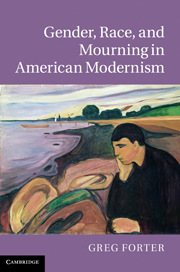Book contents
- Frontmatter
- Contents
- Acknowledgements
- Introduction
- 1 Gender, melancholy, and the whiteness of impersonal form in The Great Gatsby
- 2 Redeeming violence in The Sun Also Rises: phallic embodiment, primitive ritual, fetishistic melancholia
- 3 Versions of traumatic melancholia: the burden of white man's history in Light in August and Absalom, Absalom!
- 4 The Professor's House: primitivist melancholy and the gender of utopian forms
- Afterword
- Notes
- Index
3 - Versions of traumatic melancholia: the burden of white man's history in Light in August and Absalom, Absalom!
Published online by Cambridge University Press: 21 April 2011
- Frontmatter
- Contents
- Acknowledgements
- Introduction
- 1 Gender, melancholy, and the whiteness of impersonal form in The Great Gatsby
- 2 Redeeming violence in The Sun Also Rises: phallic embodiment, primitive ritual, fetishistic melancholia
- 3 Versions of traumatic melancholia: the burden of white man's history in Light in August and Absalom, Absalom!
- 4 The Professor's House: primitivist melancholy and the gender of utopian forms
- Afterword
- Notes
- Index
Summary
I have argued that the authors in this study began with a social intuition about the loss of a model of manhood that felt (retrospectively) viable to them. Though they refigured the “softer” components of that manhood in accordance with their creative imperatives, they grasped that what was imperiled was a manliness that combined aggressive assertiveness with compassionate interiority. Their works attempted to mourn the loss of these softer, more lyrically “feminine” attributes. The effort to mourn in turn gave rise to scathing critiques of the “whiteness” of bourgeois modernity, and to yearnings for the sensuous responsiveness and elementality that they linked to racialized modes of expression. My claim has been that, despite the evident dangers of associating women and racial minorities with the premodern, this figuration at least carried with it a knowledge of the damage inflicted by capitalist modernity and a potentially radical “memory” of less binarized racial and gender identities.
But The Sun Also Rises and The Great Gatsby betray these insights in a variety of ways. Central among these is the gesture by which their ambivalence toward the feminine and the racially other leads to an impasse in their effort to mourn. This impasse gives rise in each case to a set of melancholic aesthetic strategies. The works insist that the lost form of manhood is at once too beautiful to be relinquished and too fragile to be incarnated; they figure its loss not as a social effect of bourgeois modernity but as an inevitable and irresistible fact; and they encourage a posture of anguished capitulation toward the necessity of its destruction.
- Type
- Chapter
- Information
- Gender, Race, and Mourning in American Modernism , pp. 96 - 136Publisher: Cambridge University PressPrint publication year: 2011



